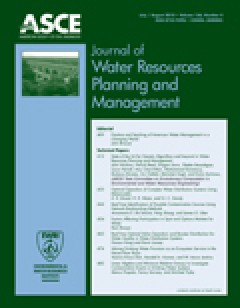Filter by

Crisis, care and childhood: the impact of economic crisis on care work in poo…
Caring for children and other dependents is crucial to human well-being, and to social and economic development. Yet, most national and international policymakers appear persistently blind to this fact, as has been highlighted by the recent global economic crisis. They need to recognise and value care work if they are to support vulnerable families from the effects of economic downturn. The 200…
- Edition
- Volume 18, Issue 2 July 2010 , pages 291 - 307
- ISBN/ISSN
- 13552074
- Collation
- -
- Series Title
- Gender & Development
- Call Number
- -

Optimal Design of Sensor Placement in Water Distribution Networks
In this study we provide a methodology for the optimal design of water sensor placement in water distribution networks. The optimization algorithm used is based on a simulation-optimization and a single-objective function approach which incorporates multiple factors used in the design of the system. In this sense the proposed model mimics a multiobjective approach and yields the final design wi…
- Edition
- Volume 136, Issue 1, Jan-Febr 2010.pp. 5-18
- ISBN/ISSN
- 07339496
- Collation
- -
- Series Title
- Journal of Water Resources Planning and Management
- Call Number
- -

Simulating Residential Water Demand with a Stochastic End-Use Model
A water demand end-use model was developed to predict water demand patterns with a small time scale (1 s) and small spatial scale (residence level). The end-use model is based on statistical information of users and end-uses: census data such as the number of people per household and their ages; the frequency of use; duration and flow per water-use event; occurrence over the day for different e…
- Edition
- Volume 136, Issue 1, January/February 2010. pp. 19
- ISBN/ISSN
- 07339496
- Collation
- -
- Series Title
- Journal of Water Resources Planning and Management
- Call Number
- -

Seasonal Residential Water Demand Forecasting for Census Tracts
The paucity of readily available demographic, economic, and water consumption data at household levels has limited the application of disaggregate water demand models. This research develops regression-based water demand models capable of forecasting single-family residential water demands within individual census tracts at a bimonthly time-step. The regression models are estimated using 12 yea…
- Edition
- Volume 136, Issue 1, January/February 2010. pp. 27
- ISBN/ISSN
- 07339496
- Collation
- -
- Series Title
- Journal of Water Resources Planning and Management
- Call Number
- -

Integrated Optimization of a Dual Quality Water and Wastewater System
When addressing urban water problems, it is no longer adequate to consider issues of water supply, demand, disposal, and reuse independently. Innovative water management strategies and opportunities for water reuse can only be properly evaluated in the context of their interactions with the broader water system. An integrated linear deterministic optimization model is applied to Beirut, Lebanon…
- Edition
- Volume 136, Issue 1, January/February 2010. pp. 37
- ISBN/ISSN
- 07339496
- Collation
- -
- Series Title
- Journal Water Resources Planning and Management
- Call Number
- -

Multiobjective Optimization of Operational Responses for Contaminant Flushing…
Contamination emergency in water distribution systems is a complex situation where optimal operation becomes important for public health. In case of emergency corrective operational actions for flushing the pollutant out of the network are needed, which have to be fast and accurate. Under such a stressful situation, trial-and-error simulation experiments with the hydrodynamic and water quality …
- Edition
- Volume 136, Issue 1, January/February 2010. pp. pp
- ISBN/ISSN
- 07339496
- Collation
- -
- Series Title
- Journal of Water Resources Planning and Management
- Call Number
- -

Large-Scale Nonlinear Conjunctive Use Optimization Problem: Decomposition Alg…
A cyclic storage (CS) system is defined as physically-integrated and operationally interconnected surface water and groundwater subsystems with full direct interactions between the subsystems. The proposed definition treats surface and subsurface impoundment subsystems as competing and potentially interconnected parallel storage facilities that minimize most of the problems associated with larg…
- Edition
- Volume 136, Issue 1, January/February 2010. pp. 59
- ISBN/ISSN
- 07339496
- Collation
- -
- Series Title
- Journal of Water Resources Planning and Management
- Call Number
- -

Water Use Intensities and the Composition of Production in Canada
The Government of Canada has endorsed a policy to promote water conservation in an attempt to reduce environmental impacts of water use. Nonetheless, total water intake, consumption, and gross water use in the business sector have increased in the period 1981�1996. Water intake intensities, measured in cubic meters of intake water per dollar of production, however, have fallen by 4%. To better …
- Edition
- Volume 136, Issue 1, January/February 2010. pp. 72
- ISBN/ISSN
- 07339496
- Collation
- -
- Series Title
- Journal of Water Resources Planning and Management
- Call Number
- -

Extreme Impact Contamination Events Sampling for Water Distribution Systems S…
In recent years, drinking water distribution systems security has become a major concern. To protect public health and minimize the effected community by a contaminant intrusion, water quality needs to be continuously monitored and analyzed. Contamination warning systems are being designed to detect and characterize contaminant intrusions into water distribution systems. Since contamination inj…
- Edition
- Volume 136, Issue 1, January/February 2010. pp. 80
- ISBN/ISSN
- 07339496
- Collation
- -
- Series Title
- Journal of Water Resources Planning and Management
- Call Number
- -

Logic-Based Design of Groundwater Monitoring Network for Redundancy Reduction
A methodology is developed based on an optimization model solution for optimal design of groundwater quality monitoring network. Redundancy in monitoring network results in economic and overall inefficiency of the network. Therefore, redundancy reduction is an important issue in the optimal design of a monitoring network. The developed methodology reduces monitoring redundancy. It incorporates …
- Edition
- Volume 136, Issue 1, January/February 2010.pp. 88-
- ISBN/ISSN
- 07339496
- Collation
- -
- Series Title
- Journal of Water Resources Planning and Management
- Call Number
- -

Multiobjective Allocation of Transboundary Water Resources: Case of the Euphr…
The allocation of water in a multicountry river system necessarily involves conflicting objectives, where increasing water benefits for one country entails losses for other countries. This paper presents the formulation and application of a multiobjective linear programming model, where each objective represents the benefits for a country from using water for agriculture, urban consumption, and…
- Edition
- Volume 136, Issue 1, January/February 2010. pp. 95
- ISBN/ISSN
- 07339496
- Collation
- -
- Series Title
- Journal of Water Resources Planning and Management
- Call Number
- -

Valuation of Flood Reductions in the Yellow River Basin under Land Use Change
An economic valuation of flood reductions arising from land use changes induced by the Conversion of Cropland to Forest and Grassland Program (CCFGP) in China is detailed in this paper. A distributed hydrologic model is used to analyze and predict changes in the probability of flood occurrences in the Yellow River Basin (YRB) due to revegetation activities under the CCFGP. The expected value of…
- Edition
- Volume 136, Issue 1, January/February 2010.pp. 106
- ISBN/ISSN
- 07339496
- Collation
- -
- Series Title
- Journal of Water Resources Planning and Management
- Call Number
- -

Pressure-Dependent Leak Detection Model and Its Application to a District Wat…
Cost-effective reduction of water loss is a compelling but challenging task for water utilities. This paper presents a model-based optimization method for leakage detection of water distribution systems. Leakage hotspots are assumed to exist at the model nodes identified. Leakage is represented as pressure-dependent demand simulated as emitter flows at selected model nodes. The leakage detectio…
- Edition
- Volume 136, Issue 1, January/February 2010. pp. 11
- ISBN/ISSN
- 07339496
- Collation
- -
- Series Title
- Journal of Water Resources Planning and Management
- Call Number
- -

Gossip in Organizations: Contexts, Consequences, and Controversies
This article examines the key themes surrounding gossip including its contexts, the various outcomes (positive and negative) of gossip, as well as a selection of challenges and controversies. The challenges that are highlighted revolve around definitional issues, methodological approaches, and ethical considerations. The authors� analysis suggests that the characteristics and features of gossip…
- Edition
- Vol. 35 no. 4 August 2010.pp. 371-390
- ISBN/ISSN
- 10596011
- Collation
- -
- Series Title
- Group Organization Management
- Call Number
- -

Cross-Cultural Generalizability of Paternalistic Leadership: An Expansion of …
Paternalism is an emerging concept with significant potential for international leadership research. Paternalistic leaders combine benevolence with authority. Paternalism is a prevalent leadership style in non-Western business organizations. In this article, the authors extend research on paternalism to the Western business context. They compare the attitudes of employees from the United States…
- Edition
- Vol. 35 no. 4 August 2010.pp. 391-420
- ISBN/ISSN
- 10596011
- Collation
- -
- Series Title
- Group Organization Management
- Call Number
- -

Emotional Intelligence and Trust in Formal Mentoring Programs
This study examined the roles of mentors� and prot�g�s� emotional intelligence and prot�g�s� trust in the mentors in formal mentoring relationships. Using reports from both mentors and prot�g�s in 147 formal mentoring dyads, results of partial least squares analysis indicated that mentors� emotional intelligence directly and indirectly related to mentoring provided through prot�g�s� trust in th…
- Edition
- Vol. 35 no. 4 August 2010.pp. 421-455
- ISBN/ISSN
- 10596011
- Collation
- -
- Series Title
- Group Organization Management
- Call Number
- -

The Mediating Role of Appraisal Feedback Reactions on the Relationship Betwee…
Although feedback is advocated as a means for influencing performance, empirical investigations indicate that the effect of feedback on performance is not uniformly positive. In the proposed model, reactions to feedback, not feedback per se, influence performance. In response to the lack of research on causal mechanisms linking feedback to performance and calls for such research, reactions are …
- Edition
- Vol. 35 no. 4 August 2010.pp. 494-526
- ISBN/ISSN
- 10596011
- Collation
- -
- Series Title
- Group Organization Management
- Call Number
- -

Organizational Cultural Intelligence: Dynamic Capability Perspective
This study introduces the conceptual foundations of cultural intelligence (CQ) at the organizational level and elaborates on its three factors: process, position, and path capability. Drawing on Early and Ang�s individual level of CQ conceptualization and Teece et al.�s dynamic capability framework, the proposed organizational CQ theory suggests how micro theories of cultural intelligence can b…
- Edition
- Vol. 35 no. 4 August 2010.pp. 456-493
- ISBN/ISSN
- 10596011
- Collation
- -
- Series Title
- Group Organization Management
- Call Number
- -

Editorial: Steps towards the Renovation of Acculturation Research Paradigms: …
Acculturation refers to cultural learning and adjustment in the context of continuous cross-cultural experience. Plato, in his �Laws�, considered cross-cultural imitation to be a risk arising from foreign commerce. In the 19th century, European theorists wrote of the amalgamation processes by which diverse peoples were culturally unified for the purposes of the nation-state. In the 20th century…
- Edition
- Vol. 16 no. 3 September 2010. pp. 299-312
- ISBN/ISSN
- 1354067x
- Collation
- -
- Series Title
- Culture Psychology
- Call Number
- -

Phenomenology of Acculturation: Retrospective Reports from the Philippines, J…
Acculturation refers to cultural learning and adjustment in the context of continuous cross-cultural experience. A phenomenology based on retrospective descriptions and analyses of self-observations in acculturation contexts may contribute to the development of theory, constructs, models, and innovative interventions. This phenomenology report focuses on 1) super-ordinate decisions, e.g., to ea…
- Edition
- Vol. 16 no. 3 September 2010. pp. 313-332
- ISBN/ISSN
- 1354067x
- Collation
- -
- Series Title
- Culture Psychology
- Call Number
- -
 Computer Science, Information & General Works
Computer Science, Information & General Works  Philosophy & Psychology
Philosophy & Psychology  Religion
Religion  Social Sciences
Social Sciences  Language
Language  Pure Science
Pure Science  Applied Sciences
Applied Sciences  Art & Recreation
Art & Recreation  Literature
Literature  History & Geography
History & Geography